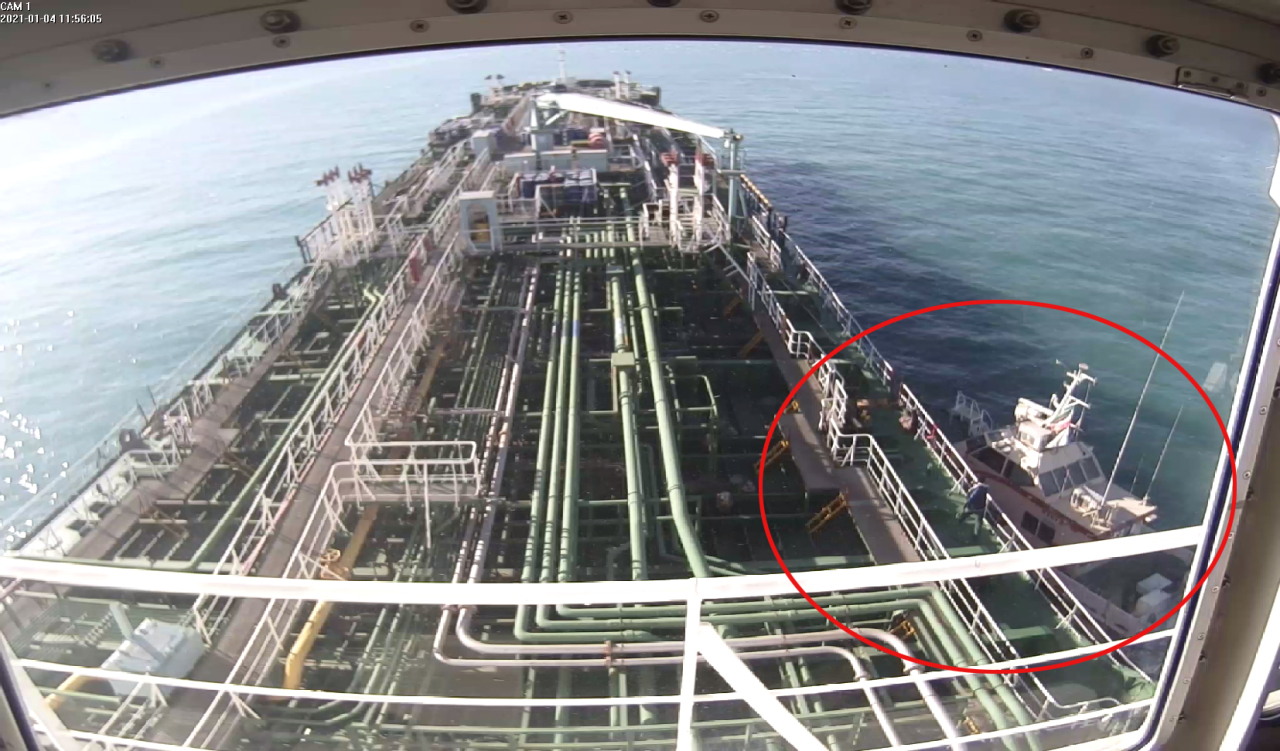
This closed-circuit TV image shows South Korean oil tanker MT Hankuk Chemi arriving in an Iranian port after it was seized by Iranian troops on Monday. An Iranian speedboat is seen in the red circle. (Yonhap)
SEOUL — Seoul is scrambling to respond to the seizure of a South Korea-flagged tanker by Iran, sending a Navy unit to the Strait of Hormuz and summoning Tehran’s envoy to Seoul demanding the immediate release of the vessel and its crew.
The Cheonghae Unit, which was operating in waters near Oman, was dispatched to the strait upon the news of the seizure and arrived in the area early in the day, according to the Defense Ministry.
The unit, on board the 4,400-ton Choe Young naval destroyer, is to closely monitor the situation in cooperation with multinational naval forces operating in nearby waters, and will also protect other Korean ships in the area.
On Monday, Iran’s Islamic Revolution Guards Corps captured the oil tanker, the MT Hankuk Chemi, and detained its crew, citing “environmental and chemical pollution concerns.” The tanker was carrying 7,200 tons of petrochemicals from Jubail, Saudi Arabia, to the United Arab Emirates when it was intercepted by the Iranian forces. The vessel has been held at an Iranian port for examination, though the operator of the tanker denied it polluted the water.
The vessel’s 20 crew members — 11 from Myanmar, five Koreans, two Indonesians and two Vietnamese — are safe, Seoul’s Foreign Ministry said, and demanded their immediate release by Tehran.
Foreign Minister Kang Kyung-wha said on Tuesday that Seoul is making diplomatic efforts to ensure the swift release of the vessel and its crew.
“We have been working to figure out the situation through the Iranian Embassy in South Korea and the South Korean Embassy in Iran and continuing to make efforts to resolve the situation,” Kang told reporters.
When asked whether the seizure reflected Tehran’s frustration over Korean banks’ decision to freeze billions of dollars in Iranian money due to US sanctions, Kang said it was not the right time to discuss the matter and that the “first priority” was to verify the facts and ensure the safety of the crew.
A Korean Foreign Ministry official met with Iranian Ambassador Saeed Badamchi Shabestari in the afternoon to lodge a protest over the seizure, and called for the early release of the vessel and its crew.
Washington has joined Seoul’s calls for Iran to “immediately release” the tanker and accused Tehran of threatening freedom of navigation for economic sanctions relief.
“The regime continues to threaten navigational rights and freedoms in the Persian Gulf as part of a clear attempt to extort the international community into relieving the pressure of sanctions,” a State Department spokesperson said, according to Reuters. “We join the Republic of Korea’s call for Iran to immediately release the tanker.”
The Iranian government, however, said the tanker’s seizure was over a “purely technical issue and due to the polluting the sea,” and that it would be dealt within the framework of the law.
The seizure comes as Tehran is pressuring Korea to release $7 billion in Iranian money from oil sales kept in Korean banks due to sanctions reimposed by the Donald Trump administration in 2018 against Iran.
Shortly before the news of the seizure, Iranian Foreign Ministry spokesman Saeed Khatibzadeh said Tehran was expecting a visit from Korea’s deputy foreign minister “in the coming days,” while complaining about the “slow process” of unfreezing the funds, according to AFP.
The seizure also comes at a time of escalating tensions between Washington and Tehran, with Sunday marking the one-year anniversary of the US killing of Qassem Soleimani, Iran’s top military general.
Tehran on Monday announced it would resume enriching uranium to 20 percent, in its most significant breach of a 2015 nuclear deal with six major world powers.
Meanwhile, the US reversed its decision Sunday and ordered the nuclear-powered aircraft carrier USS Nimitz to remain in the Middle East in the wake of “recent threats” from Iranian officials.